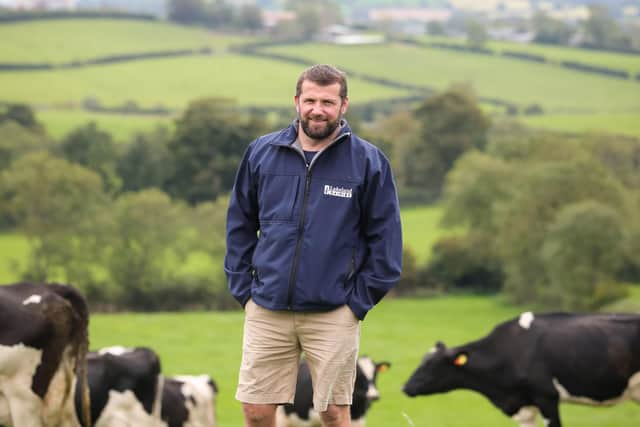Sustainable dairy research critical to tackling climate change
and live on Freeview channel 276
The sector has already reduced the carbon intensity of a litre of milk by 34% since 1990, but acknowledges that there is still some way to go.
The new publication ‘From Research to Practice on Northern Ireland Dairy Farms’ looks at three AFBI and CAFRE research projects carried out at scale in Northern Ireland, namely youngstock and heifer rearing, soil and catchment modelling, and efficient concentrate use, and profiles three local dairy farms which are putting into practice the learning from the research.
Advertisement
Advertisement
It also includes a foreword from DAERA Minister Edwin Poots and insight from Professor & Air Quality Specialist Frank Mitloehner from University of California, Davis on how various greenhouse gases are measured and the role of dairy herds in recycling carbon from the atmosphere through the biogenic carbon cycle.


Commenting on the important role local research will play in future policy decisions, Chief Executive of the Dairy Council NI Dr Mike Johnston MBE said: “It is essential that the dairy sector continues fulfilling its role in the transition towards net zero, and, therefore, we need to be mindful of the UN’s four pillars of sustainability - climate, nutrition, economy and culture. Without sustainable local dairy farm enterprises, we cannot achieve the ambition of a sustainable future.
“We need to ensure future policy decisions and incentives are evidence-based and co-designed in partnership with the sector and subject matter experts who have been studying the sustainability of dairy farms for decades.
“One such example is the findings from an AFBI research project on soil nutrients which suggest improving the pH levels of Northern Ireland dairy grazing platforms, at a cost of £30 million, could yield an impressive sevenfold return on investment.
Advertisement
Advertisement
“Each of our three fact books offer an insight into the work being undertaken at AFBI, CAFRE, the investment being made by dairy processors, and the adaptation of new technologies and practices at farm level to improve the environmental footprint of the Northern Ireland dairy sector.”
The final chapter of the factbook explores the important part good nutrition plays in a sustainable diet. It highlights Optimeal®, a modelling tool which looks at the impact of food choices, not only on the environment, but also on nutrition and food prices, to help achieve a sustainable diet that is healthy, acceptable and affordable. The model is currently being updated to include data from all the EMF member countries (Northern Ireland, Republic of Ireland, France, Netherlands, Austria, Belgium, Denmark and Norway).
The Dairy Council NI fact book is part of an EU Sustainable Dairy programme in partnership with the European Milk Forum with funding from the European Union.
To view the 2020 fact book visit the Dairy Council NI Website.